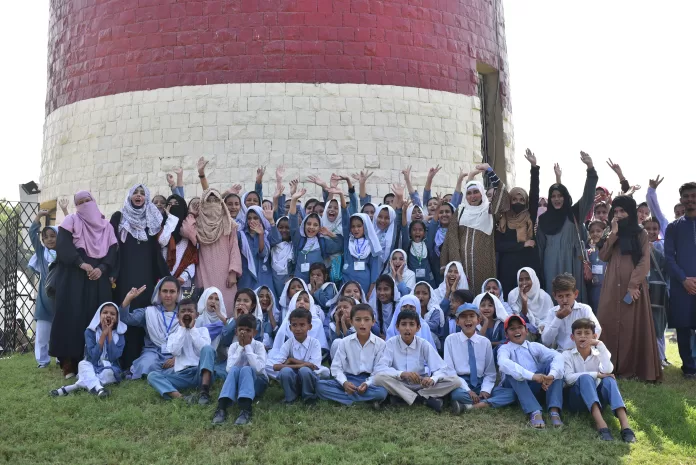The Defence Journal, had the privilege of interviewing Mr. Zahid Saeed, the Chief Executive Officer of Green Crescent Trust (GCT), one of the top educational non-profits in the country. GCT manages one of the largest networks of charitable schools in Pakistan, primarily situated in Sindh, where the issue of out-of-school children presents a significant challenge. During the interview, Mr. Zahid Saeed disclosed a startling revelation: “Pakistan recently allocated more funds to the state-run schooling system than its significant defence budget. However, the main issue lies in the lack of a check and balance system to oversee this spending and enhance the public education sector.”
Mr. Zahid Saeed, who is also Pakistan’s renowned businessman discussed in the interview the challenges facing Pakistan’s education sector and the government schooling system, along with potential solutions to address these issues. Some excerpts from the interview are appended below for our readers:
Interview
What makes the GCT unique?
The GCT has recently achieved a significant milestone by being the first non-governmental organization or non-profit in Sindh dedicated to charity work for the past 30 years, focusing on educating underprivileged children in the province. No other charity, NGO, or non-profit holds such a noble distinction. Despite facing challenges like the COVID-19 pandemic and devastating floods, our charitable mission has continued uninterrupted by the grace of Allah Almighty.
Over the last 30 years, we have established 166 charitable schools in the most neglected parts of Sindh, aiming to provide education where no formal schooling facilities existed before. These schools have a total enrollment of 32,000 students from deserving families. Our goal is to expand our charitable schools in Sindh to 250 by 2025, with a capacity to enroll 100,000 out-of-school children.
In 2023, we expanded our charitable work beyond Sindh for the first time by establishing a school in the underdeveloped Winder town of Hub District in Balochistan.
GCT becomes first non-profit in Sindh to pursue single-point agenda of educating deprived children continuously for 30 years – Zahid Saeed, CEO
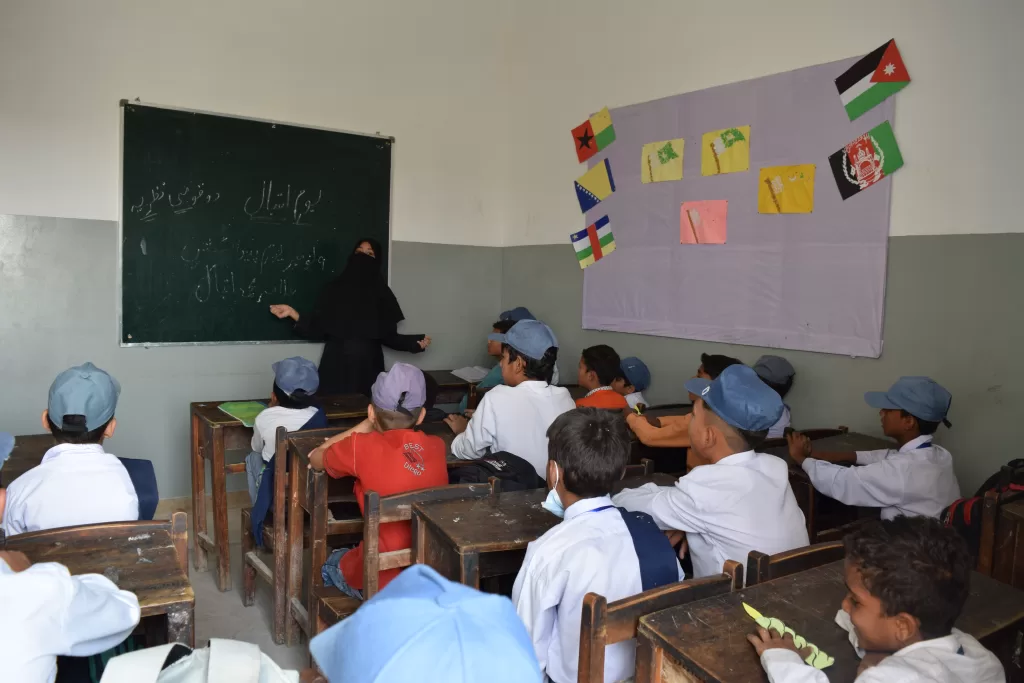
How was the concept of establishing GCT formulated three decades ago?
More than 30 years ago, my like-minded friends, acquaintances, and peers of the same age group and I pondered about initiating a philanthropic endeavour shortly after finishing our higher education. We collectively believed that beyond our primary business pursuits we should dedicate time to charitable endeavours for the benefit of the underprivileged in our society. Our elders in the family wholeheartedly endorsed this notion and generously supported us with whatever financial means they could allocate for the philanthropic cause. After extensive discussions, we conceived the notion of creating a non-profit organization solely committed to providing quality educational opportunities to disadvantaged communities. We were acutely aware that the realization of Pakistan’s advancement and growth hinged on the provision of quality educational facilities to children across the nation. Consequently, the GCT was established, commencing its journey by establishing its inaugural charitable school in a remote rural area of Umer Goth in Karachi’s District West, where the local populace lacked access to functional educational institutions. Since then, there has been a continuous and unwavering progression. Our journey began with merely 50 students enrolled in our first school, and by the Grace of Allah, our enrollment has now reached 32,000 plus students.
When formulating the foundational principles of the GCT, we resolved that our charitable initiatives would concentrate solely on Sindh, recognizing the prevalent issue of illiteracy and the significant number of out-ofschool children in our native province, which we deemed imperative to address as a primary concern.
Why has the GCT remained solely focused on the education sector throughout its journey?
Pakistan is currently facing a critical juncture comparable to China’s situation over 30 years ago. Our neighbouring country, China has emerged as a global superpower by revolutionizing its education system and ensuring that every child has access to quality education nationwide. China never compromises on the quality of its education system. Having visited China multiple times in the early 1990s for business meetings, I witnessed firsthand that it was lagging behind in development like any other third-world country until it completely transformed its education system. Over the past 30 years, China has diligently worked to provide quality education to its youth. Nobody initially believed that focusing on education could instantly revolutionize Chinese society. It is imperative for Pakistan to emulate this commitment and take decisive action without any complacency. Given this context, the GCT has been unwavering in its mission to enroll outof-school children in Sindh, recognizing that illiteracy is a major factor contributing to the increasing levels of backwardness and poverty in Pakistan. Impoverished communities in Pakistan can only break free from economic exploitation by ensuring that quality education is provided to future generations. Without access to basic education, Pakistan cannot aspire to become an Asian tiger or a developed nation.
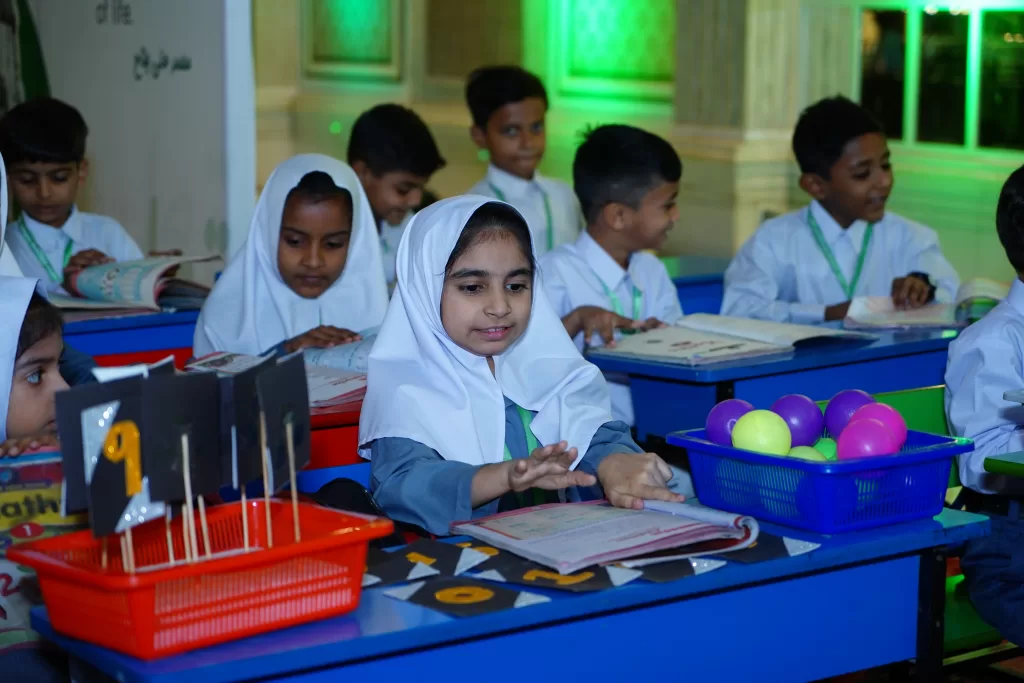
Does the issue of illiteracy pose any challenge to the security of the State of Pakistan?
Over 26 million children under 16 who are out of school could pose a significant security threat in Pakistan in the next five to ten years if this aspect is not addressed promptly. Lacking access to education and legitimate means of livelihood, these vulnerable children are susceptible to being manipulated by anti-Pakistan propaganda for involvement in terrorist acts. It is imperative to combat illiteracy in Pakistan now by prioritizing their education. Japan emerged as a powerful nation after overcoming the nuclear holocaust that destroyed two of its cities. The path it chose was education, as the Japanese people understood that literacy was the only way to overcome immense backwardness and destruction. Pakistan is sleepwalking into a war zone if the grave issue of illiteracy is not addressed now. It is definitely a now-or-never situation.
Over 26 million children under 16 who are out of school could pose a significant security threat in Pakistan in the next five to ten years if this aspect is not addressed promptly.
Can you elaborate on the organizational structure and certifications held by GCT as a distinguished Pakistani charity?
GCT complies with all necessary regulations for fundraising within Pakistan and internationally. We have obtained approvals, certifications, and NOCs from federal, provincial, and other regulatory bodies, including the Economic Affairs Division of the federal government. Our internal and external audits are conducted by the top five global audit and accountancy firms, and the audited accounts are regularly published on our website to ensure transparency in financial matters. These certifications establish GCT as a leading name in the Pakistani charitable sector. Additionally, GCT maintains a well-defined corporate organizational structure for efficient administrative management. With its headquarters in Karachi and over 50 staff members, we have a Chief Operating Officer overseeing seven departments, each led by a department head. Our management committee convenes weekly meetings with patrons and heads of departments to review organizational and operational matters. We strive to limit administrative expenses to no more than 15% of our budget, ensuring that the majority of funds from donors, patrons, and supporters are directed towards our primary mission of providing education to underprivileged children in Sindh.
Does the GCT prioritize girls’ education?
Women’s empowerment and girls’ education are key aspects of our charitable efforts. More than 40 per cent of students in GCT’s schools are girls, and over 85 per cent of the 1900 teaching and non-teaching staff are female. GCT has always been committed to equal opportunities. We firmly believe that educating a daughter from an impoverished family is crucial for educating the next generation. I strongly believe that Pakistan’s future cannot be transformed without ensuring quality formal education for every girl child across the country.
False Myth: GCT has not faced opposition from any feudal leader in rural Sindh regarding providing quality education to girl children in underprivileged communities. All the feudal leaders we encountered became active partners and supporters of our mission to educate children from disadvantaged families in rural Sindh. We are grateful for their support.
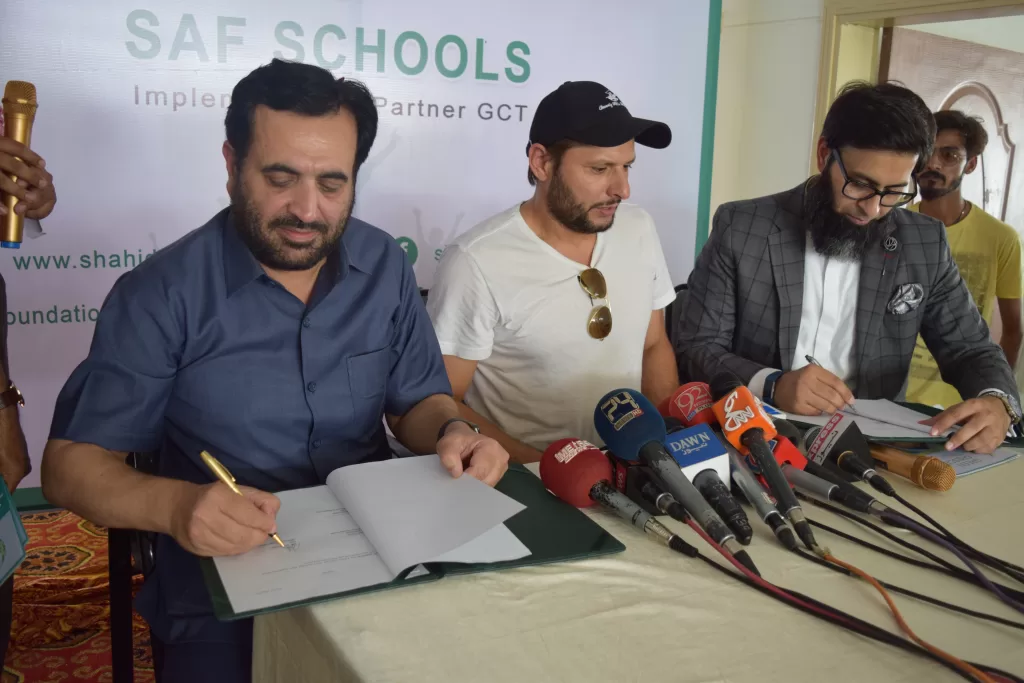
Can you share your recent achievements with our readers?
On March 23, 2024, I was deeply honoured to receive the prestigious civil award of Tamgha-e-Imtiaz at the investiture ceremony held at the Sindh Governor House. The award was presented to me by Sindh Governor, Kamran Khan Tessori on behalf of the President of Pakistan. I am grateful that the government has recognized efforts by the GCT in providing quality education to underprivileged children in Sindh. This recognition has strengthened our dedication, along with my team at the GCT, to continue our mission. The award serves as motivation for our supporters, donors, and well-wishers who have shown unwavering commitment to eradicating illiteracy by ensuring all out-of-school children in Sindh are enrolled. I dedicate this honour to the philanthropists and donors who have supported us throughout our 30-year journey in establishing and running quality schools for underserved families. Receiving this prestigious award has further fueled our efforts to provide quality education to children in the most underdeveloped areas of Sindh.
Has GCT formed an alliance with any other non-profit organization to advance its goals in the education sector?
Our ongoing collaboration with the non-profit Shahid Afridi Foundation (SAF) has set a positive example for other dedicated charities in the education sector to work together towards eradicating illiteracy in Pakistan efficiently. Since partnering with SAF in 2018, we have become a role model for other NGOs in successfully operating charitable schools for underprivileged children in collaboration. Together, we man age 12 charitable schools in disadvantaged areas on the outskirts of Karachi. I extend my sincere thanks to Pakistan’s renowned sports figure, Shahid Afridi, for wholeheartedly supporting this partnership for a noble cause. I deeply appreciate the extensive charitable and philanthropic efforts led by Shahid Afridi. The management of SAF has provided us with the utmost support in running these schools, and we are thankful for the assistance from the SAF team. We aim to expand this partnership further to address the pressing issue of out-of-school children promptly. Initially, this collaboration was limited to just two schools but has grown over time. I firmly believe that other charities, non-profits, and NGOs with similar missions in Pakistan are not our rivals but rather allies of GCT. The Green Crescent Trust is keen on establishing similar partnerships with like-minded NGOs and charities in the education sec tor to implement a rapid strategy in tackling the issue of out-of-school children. Pakistan’s advancement and progress hinge on resolving this fundamental social challenge.
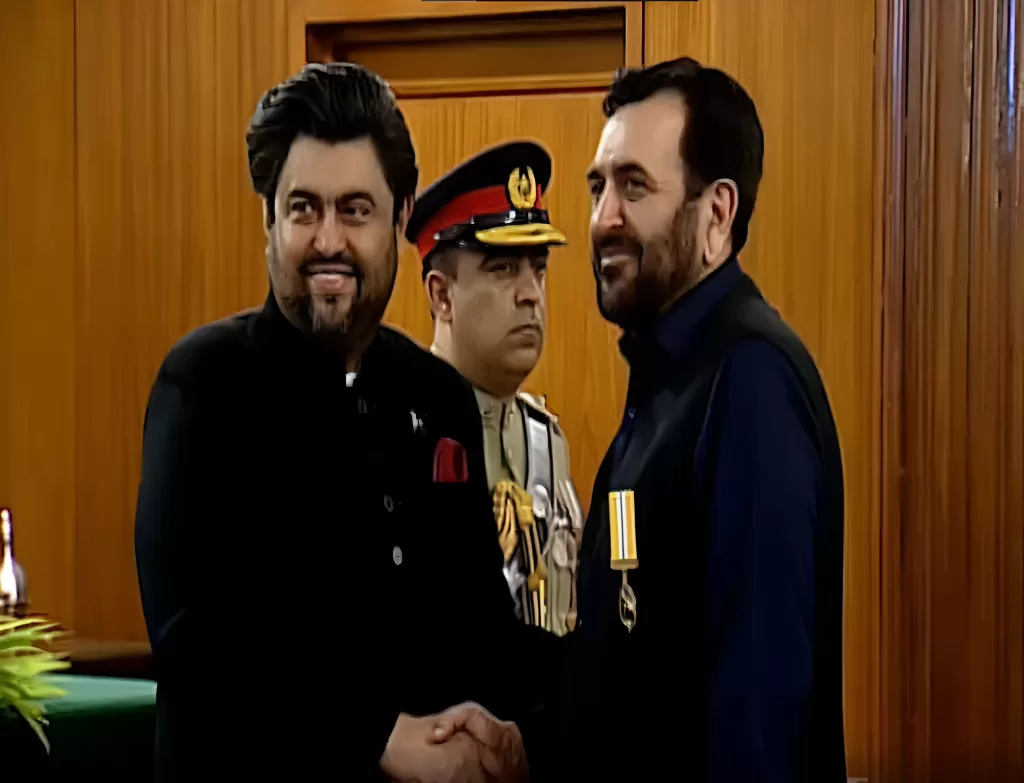
Has GCT conducted any research related to Pakistan’s education sector?
I want to share the results of a recent, groundbreaking study on Pakistan’s education sector carried out by my charity’s research division. I believe that the surprising findings of this study will be of great interest to Defence Journal readers. A few years ago, GCT’s research team was assigned the task of determining the total expenditure by the federal, provincial, Azad Kashmir, and Gilgit-Baltistan governments in a fiscal year to support the public education system in the country. The study results, compiled in 2020, revealed that in the previous fiscal year, all these governments collectively spent a substantial amount of Rs 1300 billion solely on running the government-funded education system. In comparison, the defence budget for that year was Rs 1,289 billion indicating that the state had allocated more funds to its educational system than to its military in recent times. The surprising findings of the research were shared with key government and military officials, as well as federal and provincial authorities, many of whom were unaware of the significant budget allocations for the public schooling system. Despite such a large expenditure, the performance of the government-run school system in our country has been unsatisfactory. Each provincial government in Pakistan dedicates 20 to 25 per cent of its total budget to maintaining these schools. In the current fiscal year, the Sindh government has set aside Rs 340 billion for this purpose. Graduates of the public education system often struggle to contribute meaningfully to Pakistan’s progress and development. Affluent individuals in urban areas nationwide typically opt to enroll their children in prestigious private schools. Generally, there is a demand from concerned parties to significantly increase GDP allocation for the education sector in Pakistan due to the low literacy rate and declining academic standards. However, I firmly believe that there is already a substantial allocation for the staterun school education system, which yields highly unsatisfactory results. A large portion of this allocation is spent monthly on salaries and pensions for teaching and non-teaching staff at government schools. In addition to the poor quality of education, government-run schools often lack basic academic and infrastructure facilities, a well-known issue. There is a lack of effective checks and balances to ensure that this substantial budget is spent with accountability and transparency. The education budgets of federal and provincial governments continue to grow each year mainly due to inflation, similar to the defence budget. Efficient utilization of this budget would enable the state to fulfil its constitutional duty of providing quality school education to all children in the country without discrimination.
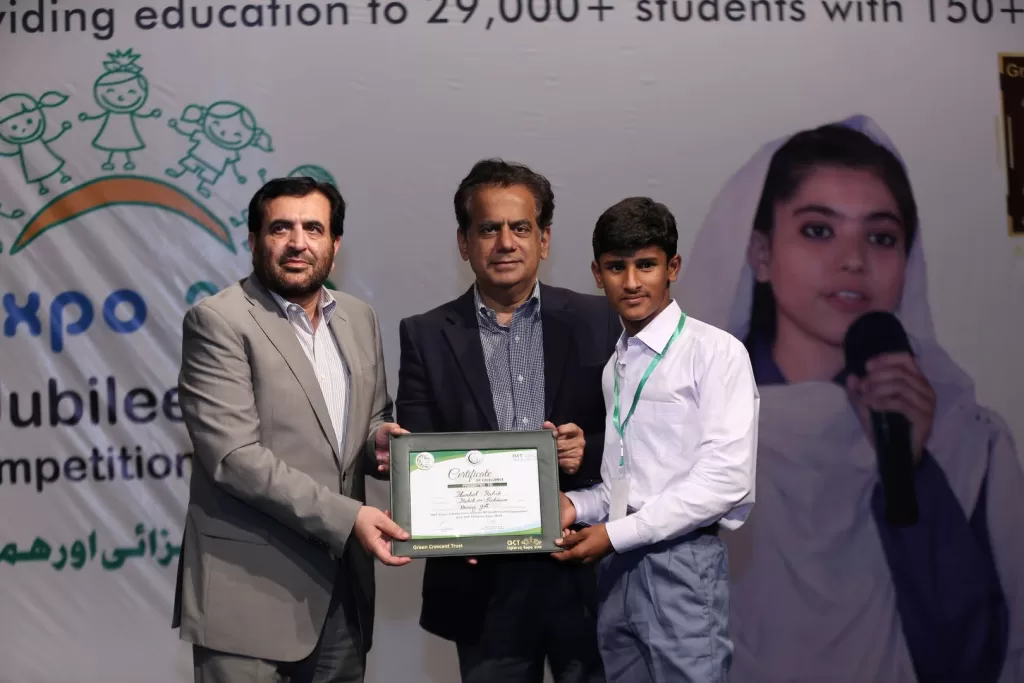
Has the GCT offered to assist the government in reforming the education sector?
With 30 years of experience in the education sector, we are fully committed to supporting provincial governments in addressing the issues faced by students in government-run schools. Since education has become a devolved subject post the 18th Constitutional Amendment, it is primarily the responsibility of provincial governments. We believe that organizations like GCT should collaborate with provincial governments to implement effective systems similar to those used in charitable schools. This collaboration could be facilitated through the government’s public-private partnership program. We have previously partnered with the Sindh government through the Sindh Education Foundation to work together in the education sector. Results have been a reduction on per student spend and improved quality of education. Despite the lower spending, up to 37.3 percent of GCT graduates achieve A-1 and A grades in matriculation exams. We are willing to assist all levels of government in Pakistan in implementing transparent and effective systems to optimize their education budgets. Even the combined resources of NGOs and the private sector are no match for the government’s resources to manage the vast network of state-run schools. Our support for the government in Pakistan is always available. I suggest that genuine and dedicated NGOs in the education sector should come together and form a body to offer vivid consultation to the government for implementing much-needed reforms in the state-run school education system.
Could you share details about GCT’s collaboration with the Sindh Education Foundation (SEF)?
We are a partnering NGO of SEF, an extension of the Sindh government, which follows the public-private partnership model to implement various initiatives, including non-formal education programs, to address the challenges of illiteracy and out-of-school children in Sindh promptly. We operate 17 charitable schools in collaboration with SEF in underprivileged areas of the province. We highly appreciate this collaboration with one of the most dedicated and proactive government subsidiaries in the education sector, striving to establish high-quality educational institutions for children in neglected and remote areas of Sindh. Recently, SEF Managing Director, Abdul Kabir Kazi, graced the GCT-SAF joint fundraiser in Karachi as a distinguished guest, commending the efforts of both organizations in the education field and expressing a keen interest in establishing more educational facilities through the partnership of both non-profits.
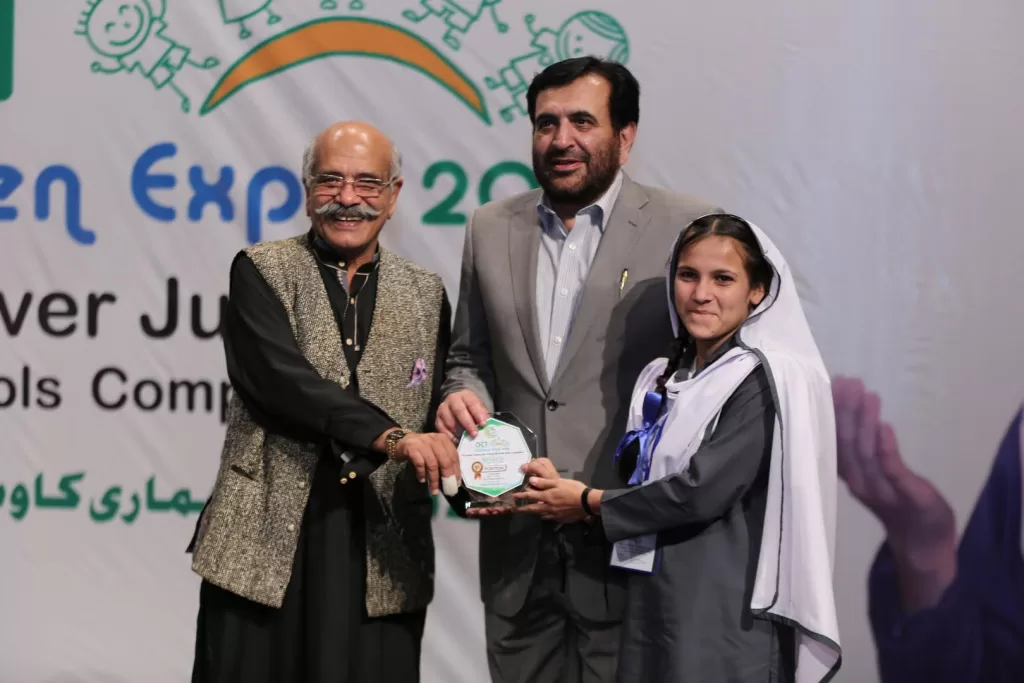
How productive have the alumni of GCT been for society?
The alumni of GCT schools have been serving in prestigious government, public, and private sector organizations in senior positions. Many graduates have chosen careers in the armed forces, mass media, NGOs, and education sector and industry inspired by GCT’s mission. Many of GCT’s teaching staff are former students, with some reaching prestigious positions as school principals and vice-principals. Some ex-students have even established their own successful schools after serving in GCT’s system. Graduates from charitable schools in Tharparkar have contributed to projects like Thar coal project. These examples demonstrate that a majority of GCT alumni find honourable livelihood opportunities, enabling them to support their families.
GCT values its alliance with Sindh Education Foundation as effective public-private partnership model to educate deprived children. – Zahid Saeed
Are there any other charitable initiatives of the GCT?
We have installed water projects that serve approximately 1600 villages in Tharparkar benefiting over 600,000 people. Following our policy, we exclusively focus on water projects in the Thar region only. Once a water project is completed, a committee consisting of elders from the village is established to supervise its operations and maintenance. These water projects complement our primary focus on education in Thar. The Centre for Educational Research and Development (CERD) of the GCT has been organizing professional training courses for teachers for many years, resulting in the graduation of numerous skilled educators. We also operate an orphan support program that benefits 2,000 orphaned children and their families through continuous special assistance throughout the year.
Tell us more about the training arm of the GCT i.e. CERD?
The CERD was established primarily to train teachers recruited for the GCT schools at the time of their selection. These teachers mostly come from remote rural areas in Sindh where our schools are located, so training them before they begin teaching is essential. The in-service training sessions for our teachers continue at the CERD during summer and winter breaks. We have a separate office for CERD in Karachi with a modern training hall. The CERD also serves as a think tank to participate in curriculum development to provide quality school education for children from underprivileged areas. It also conducts innovative researches on various educational issues in the country. The female teachers who undergo training at CERD become valuable members of Pakistani society, contributing significantly to the development and progress of Pakistan. These trained teachers from GCT are the champions of our primary mission to ensure girls’ education in underdeveloped areas of Sindh.
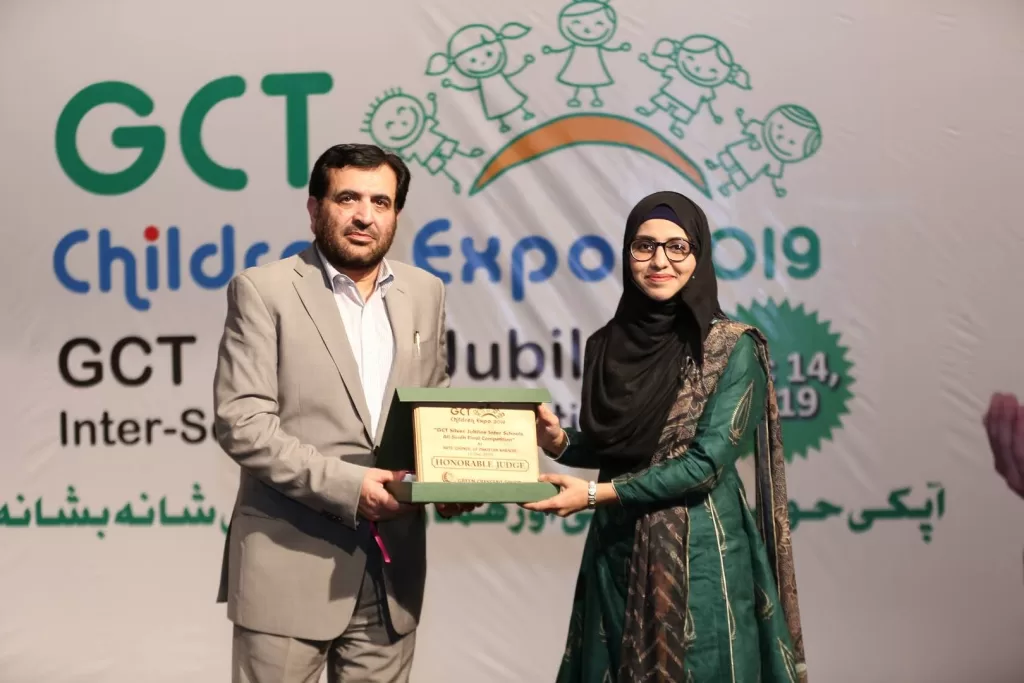
Has the GCT devised a plan for inclusive education?
I am happy to share with Defence Journal readers that our non-profit organization has initiated its backend work, to partner with the Sindh government to introduce special accessibility features in school buildings for differently abled children. I firmly believe that both public and private schools should have these features, and GCT will collaborate with the provincial authorities to achieve this goal. I am also pleased to announce that steps are being taken to integrate the concept of inclusive education into the premises of GCT’s existing school facilities. The GCT’s motto stands for ensuring the inclusivity of educational premises all over Sindh.
GCT is pioneering non-profit in Pakistan’s education sector whose school introduced smart classroom concept:
In 2012, the Green Crescent Trust achieved the milestone of being possibly the first non-profit in Pakistan’s education sector to implement the “Smart Classroom” concept in its charitable school. This initiative aimed to effectively utilize the latest technology to educate children from underprivileged communities. The concept was initially launched at the Sharifabad campus in Karachi, utilizing projectors and touchscreens to introduce a technology-based smart learning system.
This occurred even before some elite private schools in Karachi, which charged high fees, introduced their technology-based smart classroom systems. This significant step inspired other non-profits and non-governmental organizations in the education sector to implement similar technology-based teaching systems in their schools. Recently, the Sindh Education Foundation introduced smart learning systems using computer tablets to launch a crash school education program for illiterate children in remote, underprivileged areas of the province.
GCT prioritizes minimal spending on extravagant school buildings to ensure maximum donations are allocated to its primary educational mission?
The main focus of GCT has always been to promptly establish a quality school in underprivileged areas or villages in Sindh which lack educational institutions. Rather than waiting for the construction of a grand school campus, we opt for utilizing rental premises or constructing makeshift facilities with minimal time and cost. This approach guarantees the swift initiation of our core mission – providing education to underprivileged children.
Building expensive academic structures has never been our main concern. By doing so, we ensure that the funds received from our generous donors are primarily utilized for enrolling out-of-school children, with minimal expenditure on physical academic facilities. Numerous instances in GCT’s history demonstrate our commitment to promptly starting educational services, such as in Sohrab Khan Goth, Rehri Goth, and Wangi Goth areas in Karachi. Proper school campuses were developed in these underserved areas once adequate financial resources became available. We also established temporary schooling facilities in flood-affected regions in Sindh, where existing academic infrastructure had been destroyed by natural disasters. The impoverished Mehran Town area in Karachi stands as a testament to our dedication providing quality education for over 25 years. Our four charitable schools in this disadvantaged locality cater to a total of 1,000 students.
Later, we decided to construct a cutting-edge school campus in the same area upon realizing the need for a large academic facility to address the issue of out-of-school children in the community. This decision was made possible by a generous and dedicated donor who funded the construction of this costly school facility. Our CEO, patrons, and trustees all share a strong determination to swiftly address the problem of outof-school children in Sindh.
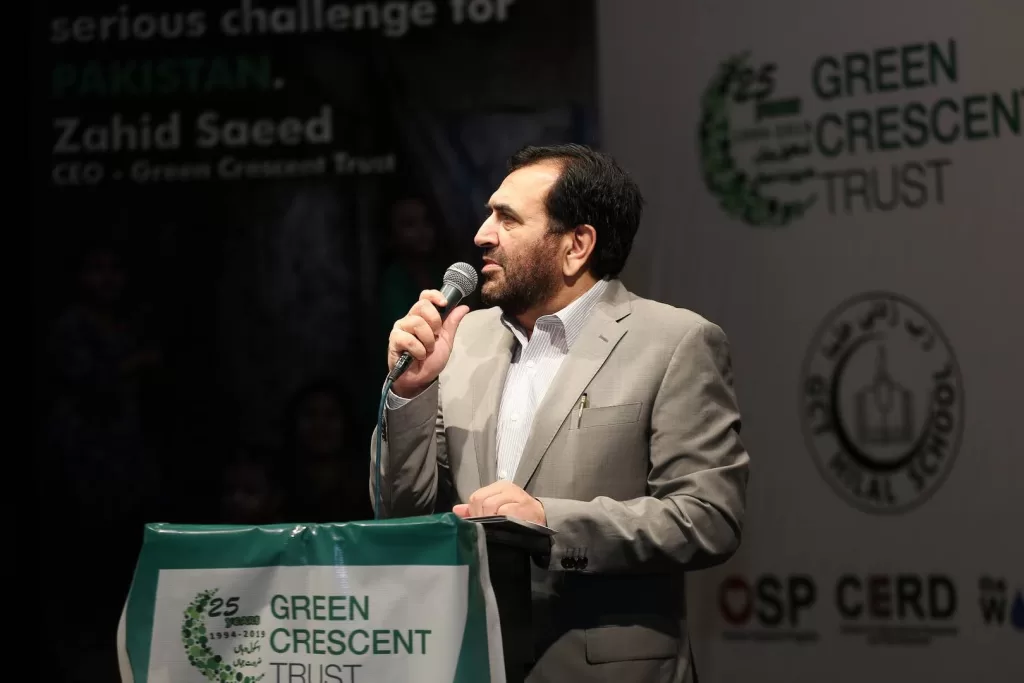
What is your message for the GCT’s donors and well-wishers?
I am deeply grateful to all the partners, donors, supporters, and well-wishers of the GCT who have continuously supported us for the past 30 years in advancing our mission of educating children from impoverished families in Sindh. I extend my heartfelt thanks to our Patron-inChief and renowned industrialist of the country, Sardar Yasin Malik, and his family for their significant support over the years in successfully implementing our school education program. It is undeniable that our achievements would not have been possible without the generous philanthropic support of these individuals. I urge Mr. Ikram Sehgal, the esteemed publisher of this periodical, and other concerned businessmen and philanthropists to actively join us in our charitable efforts to eradicate the pressing issue of illiteracy in Sindh as quickly as possible.


